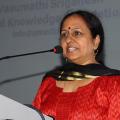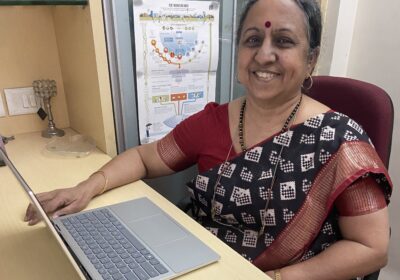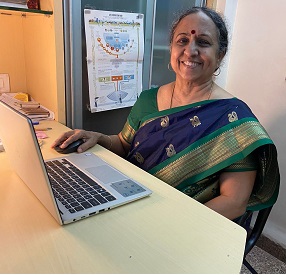In 2013, I had written a blog post – Can you get me this article please? where I had mentioned about the struggle for getting full text articles, especially if one is not attached to a library that subscribes to several journals. Anyone who keeps up with published literature, carries out research or writes for publication, will obviously read articles. And rightly so.
In five years, I believe that some libraries in India would have added more journals to their subscriptions. I am sure many have not added more. Some would have even cut down on their list.
Irrespective of the above, today I wonder how many in an institution, really know what journals their libraries subscribe to. Last year, I had a resident who told me that his thesis protocol was rejected because he had cited old literature. When I asked him whether he could not find any new literature on the topic, his answer was – “Those articles were not available free online”! And when I asked him whether he tried for any of them in his library, he looked sheepish.
While all these incidents repeatedly prove the need for more training in the field of “information usage / information literacy”, the need for access to full text articles and more bibliographic databases is soaring.
In the last few months, I have been approached by several people for help. They wish to author systematic reviews and obviously need to search several databases. It is said, that for writing a Cochrane Review, one must at least search Medline, EMBASE and Cochrane – CENTRAL. Interestingly in India, EMBASE is available only in the corporate sector libraries / information centres. And unless one of the authors of a review has access to EMBASE through his / her institution, the groups is legally not supposed to search EMBASE.
So how will this review be complete then?
And then, systematic reviews in other health sciences areas require the use of some more databases like CINAHL, Psycinfo and many others. And once authors search all the necessary databases, the next hurdle is to get full text articles.
So what are people doing about this?
- There are of course some excellent libraries in India and people studying or working in these institutions are just fortunate to have access to lots of journals in print and electronic format. I am sure their librarians do help them with articles they need
- I am also aware that several students and professionals use not-so-legal approaches to getting access to databases and to articles. Some do it out of ignorance, and some believe that for academic use, there is no copyright barrier. They are wrong, but have no intention of being wrong
I too believe that research information should be available to all researchers. I believe that having to pay a hefty publication fee for getting an article published (and am speaking of legal open access journals and not predatory journals) is not the solution. There has to be a win win situation, where the author has an opportunity to get his/her research easily accessible, the publisher makes money to run the publication and the readers get access at affordable costs. Well, the last bit is what libraries always did – get readers access at affordable costs! And we need to ensure that this happens in India, in different ways!
I have a dream for India – for this. With two major approaches:
I. National Licenses for Resources
If India could pay for a National License for the Cochrane Library, can we not do the same for a handful of bibliographic databases and journals? My recommendation would be:
Bibliographic databases:
EMBASE, OVID Medline (because it allows slightly more complex searching options than PubMed does), CINAHL (for nurses), and some more that can be determined if more experts put their heads together
Journals:
All journals mandated for PG courses, and some more titles decided by experts in each field.
Who will pay for the access?
It would be difficult to answer this immediately. It needs a dialogue between Publishers / Aggregators / Agents and the Councils / Government. We need to come up with a right scheme and balance, where the Government pays a part of it, and all stakeholder institutions and individuals pay a part. I believe we have enough collective intelligence in the country to arrive at ideas to achieve this balance.
II. A very strong library network across the country
I am speaking in the context of health sciences. We have a “Union Catalog” which allows us to know the availability of a journal in any health sciences / science library in the country. This needs to be exploited correctly for all health professionals to reap the benefits of what is spent on health libraries.
- Every student and professional should know how to use this.
- The catalog should be kept regularly updated – not just by the host, but every health science library should contribute their data to this at regular intervals
- There has to be a dependable method (rules and know hows) for every library to ask each other for copies of articles at fixed charges, for their users
- Private practitioners and those not attached to institutions should have a facility to become members of their city-based libraries and avail of this facility – within established frameworks.
Could I invite comments on how we could push both these options? Put on your thinking caps! Let us know
- If you are ready to join a think tank to brainstorm and move ahead
- Who you feel are the right people from the Government to take this ahead
- Who else – people of influence – would contribute to this big change.
We are waiting for your comments!






This is indeed very timely discussion. Schooling of practitioners is also arranged by different pharmaceutical companies through CME programs. They also arrange for other modes of continuing education. Why should we not pitch them in? Please consider this.
Yes, i am ready to share thoughts and action.
To begin, just a few flitting thoughts.
Its difficult to suggest people in the government or administration who could and would respond but there are a group of very influential and respected physicians who regularly help the government on policy matters, who could be the bridge. To name offhand, Dr Devi Shetty of the NH group, Dr. A K Dash from JIPMER, Dr Sasank Joshi from Mumbai and many others, whom probably our young colleagues could suggest.
As a professional body I could only think of the ICMR with its huge and widespread reach and influence.
Again, the largest group that should benefit from this initiative are the non institutional general physician, remember that they form the single largest caregiver group, earn meagerly compared to the specialist and often work hard and thanklessly, almost like a daily wage earner, to whom knowledge is a necessity, yet elusive like a good dream.
Probably pharma tie ups (they have the biggest penetration in this segment) might help to reach them.
And, knowledge harvesting practices must be mandatory as a part of the medical carriculum and should be an assesable parameter straight from the MBBS level. Our proposed leader doctors could help.
Thanks, shall be in touch
Sdg
Wonderful blog! I was not aware about the existence of a Union Catalogue of libraries and their subscriptions!
I humbly put forth my ideas –
I. National Licenses for Resources
– The Govt can set up a department/company to purchase nation wide access to all bibliographic databases and journals required and using the model of Netflix or Amazon Pay, an individual can purchase monthly access to all journals OR can have selective access to specific articles (articles can be rented or bought) similar to the model of Google Play Books app.
– The public should be given a wide array of plans to choose from
#Advantages
– the company can use funds from grants if in loss (which will be diverted from funds being received currently by libraries), or it can even turn profitable if managed properly.
– Each person pays for himself initially. Aadhar based authentication and Aadhar based Direct Benefit Transfer can be given to verified individuals especially students for access so that they eventually get to read the articles for free.
#Disadvantages –
– too much centralisation
– Effecient technology support will be continuously required
– Does not seem practically possible in near future
II. A very strong library network across the country
A) Dependable method (rules and know hows) for every library to ask each other for copies of articles at fixed charges, for their users :
For this, all the journals can be categorised in class A/B/C/D (depending on quality and demand of journals). Article from journals of Group A can be sold at Rs X per article while Group B can be sold at a different rate and so on.
B) Private practitioners and those not attached to institutions should have a facility to become members of their city-based libraries and avail of this facility – within established frameworks. – This can be easily done and should be encouraged. Perhaps your organisation can come up with a draft guideline after discussions and other libraries can suitably modify/accept it as it is.
III. I wish to suggest a third approach.
Can the publication houses and private journals with good online traffic utilise it (exploit it) for financial gains – by showing advertisements on the websites/apps. This will increase their revenue and subscription costs can come down.
Also, journals should stop printing journals to decrease costs and become online – only for individual subscribers.
Best wishes
Parth Gada
Intern
Seth GS Medical College and KEM Hospital, Mumbai